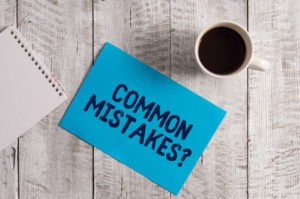Five Estate Planning Mistakes to Avoid

While it’s true that no estate is completely bulletproof, there are mistakes that people make that are big enough to walk through, while others are more like a slow drip, making things harder in a slow but steady process. There are common estate planning mistakes that can be easily avoided, reports Comstock Magazine in the article “Five Mistakes to Avoid When Planning Your Estate.”
- Misunderstanding Estate Law. Some people are so thrown by the idea of an estate plan, that they can’t get past the word “estate.” You don’t need a mansion to have an estate. An “estate” does not mean extreme wealth. The term is actually used to refer to any and all property that a person owns, regardless of debts. Even people with modest estates need a plan to help beneficiaries avoid unnecessary costs and stress, and typically estate planning is even more critical for such individuals. Talk with an estate planning attorney to learn what your needs are, from a will to trusts to incapacity planning. Make sure that this is the attorney’s key practice area. A real estate attorney, family law attorney or the friend or family member who is a lawyer won’t have the same knowledge and experience.
- Getting Bad or Incomplete Advice. It takes a team to create a strong estate plan. That means an estate planning attorney, a financial advisor and an accountant. Look for a firm that will tailor an estate plan specifically to your goals. The is no one size fits all approach, and many tools are needed for a complete estate plan. Buying an insurance policy or an annuity is not an estate plan, but may helps achieve those goals.
- Naming Yourself as a Sole Trustee without a Back-up. Naming yourself as a sole trustee puts you and your estate in a precarious position. What if you develop Alzheimer’s or are injured in an accident? A trusted individual, a family member, a longstanding friend or even a professional trustee, needs to be named to protect your interests, if you should become incapacitated. This is also why you should have Durable Financial Powers of Attorney and Healthcare Powers of Attorney, among other documents, to ensure someone you trust may act on your behalf if you cannot.
- Losing Track of Assets. Without a complete list of all assets, it’s nearly impossible for someone to know what you own and who your heirs may be. Some assets, including retirement funds, life insurance policies, or investment accounts, have named beneficiaries. Those people will inherit these assets, regardless of what is in your estate plan. If your heirs can’t find the assets, they may be lost or there may be a long delay in obtaining them. If you don’t update your beneficiaries, they may go to unintended heirs—like children of prior relationships, someone other than your spouse and so on.
- Deciding on Options Without Being Fully Informed. When it comes to estate planning, the natural tendency is to go with what we think is the right thing. For example, people often say “I just need a will,” but learn later that the will requires probate, or doesn’t address the disability of a child. However, unless you are an estate planning attorney, chances are you don’t know what the right thing is. For tax reasons, for instance, it may make sense to transfer assets, while you are still living. However, that might also be a terrible idea, if you choose the wrong person to hold your assets or don’t put them in the right kind of trust. It may also make sense to leave income taxable assets to charities, and non-income taxable assets such as life insurance, to individuals. You don’t know what you don’t know, so it is important to work with an estate planning attorney to craft the plan that’s right for you. See here for some estate planning frequently asked questions to get you started. https://galligan-law.com/estate-planning-questions/
Estate planning is still a highly personal process that depends upon every person’s unique experience. Your family situation is different than anyone else’s. An experienced estate planning attorney will be able to create a plan and help you to avoid the big, most commonly made mistakes. Please contact our office to discuss how your plan can avoid these estate planning mistakes.
Reference: Comstock Magazine (Dec. 2019) “Five Mistakes to Avoid When Planning Your Estate”

